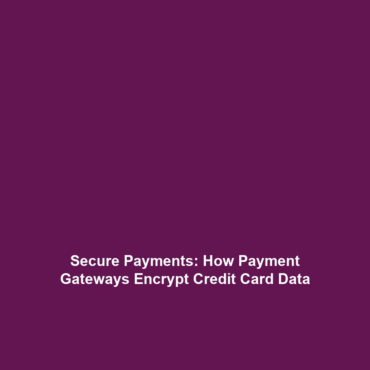Payment Gateways: Encrypting Credit Card Data to Secure Online Payments
In today’s digital landscape, payment gateways play a pivotal role in facilitating secure online transactions. The encryption of credit card data is a cornerstone of this process, ensuring that sensitive information remains confidential between merchants and customers. Within the broader context of cryptography, this practice enhances trust and safety in the e-commerce ecosystem, preventing fraud and data breaches. As we delve deeper, we will explore the mechanisms of payment gateway encryption, its applications, challenges, and innovations shaping its future.
Key Concepts
Understanding how payment gateways encrypt credit card data requires a grasp of several key concepts in cryptography. Here are the major principles:
- Encryption Algorithms: Payment gateways employ advanced encryption algorithms, such as AES (Advanced Encryption Standard) and RSA (Rivest-Shamir-Adleman), to transform sensitive data into unreadable formats.
- SSL/TLS Protocols: Secure Socket Layer (SSL) and Transport Layer Security (TLS) are protocols that ensure secure data exchange between the customer and the payment gateway.
- Tokenization: This process replaces sensitive credit card information with unique identifiers or tokens, further protecting the data from theft during transactions.
Applications and Real-World Uses
The applications of payment gateways encrypting credit card data are vast and critical in various sectors. Here’s how it is utilized:
- eCommerce Platforms: Websites like Amazon and eBay use payment gateways to securely handle millions of transactions daily, encrypting credit card details to protect buyer information.
- Mobile Payments: Apps such as PayPal and Square leverage encrypted payment gateways, allowing users to make secure transactions via smartphones.
- Subscription Services: Services like Netflix and Spotify utilize payment gateways for automatic billing, ensuring that customers’ credit card data is securely processed.
Current Challenges
Despite the sophistication of payment gateway encryption, there are several challenges and limitations:
- Data Breaches: Despite encryption, companies are still vulnerable to data breaches, requiring continuous advancements in security measures.
- Compliance Issues: Navigating the complex landscape of regulations like PCI DSS (Payment Card Industry Data Security Standard) can be daunting for businesses.
- Technological Advancements: As technology evolves, so do the methods employed by hackers; thus, payment gateways must regularly update their encryption techniques.
Future Research and Innovations
Looking ahead, ongoing research and innovations are set to redefine how payment gateways secure credit card data:
- Quantum Cryptography: This emerging field promises an unprecedented level of security by utilizing the principles of quantum mechanics.
- Blockchain Technology: Innovations in blockchain can improve transparency and reduce fraud in online transactions.
- AI-Driven Security Measures: Artificial intelligence is being integrated into payment gateways to detect and mitigate fraud in real-time.
Conclusion
In conclusion, the encryption of credit card data within payment gateways is crucial for ensuring secure online transactions. As cryptographic technologies advance, so too will the effectiveness of these systems in safeguarding sensitive information. It is imperative for both businesses and consumers to stay informed about these developments. To learn more about cryptographic principles and their applications, explore our detailed articles on cryptography basics and secure payments technology.
